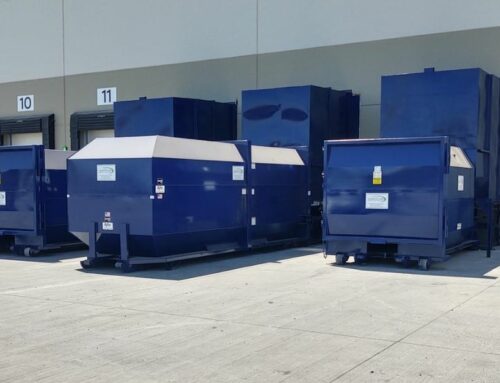Do I need a trash compactor? Or, is a baler a better solution for me?
These are questions that you and many others have spent time grappling with. Managing your waste stream is a crucial part of a business’s operations, so you must choose the piece of equipment that best meets your needs. Trash Compactors and Balers are similar machines in that they both reduce volume through compression, but different in the types of materials each can process.
- Trash Compactors– Can process a much wider range of materials than a baler. They can handle both dry waste + recyclables and wet waste as well. If you need equipment for typical household trash or wet materials that produce liquid such as food waste, then a baler is not an option. The decision is easy- You’ll need a trash compactor.
- Balers- Are only used for recyclables. If you need equipment for material such as paper, cardboard, plastic, aluminum, and other scrap metals, then balers remain in play.
Now you’re probably wondering, “So if I need equipment for recyclables, which is the better solution?”. Well, it depends on your situation. People are surprised by the paradox since balers are strongly associated with recycling; however, it’s not uncommon for a compactor to be a better solution. There are advantages to each. To determine which machine is best suited to handle your recyclables, you’ll need to evaluate your priorities.
Some advantages of a Vertical Baler are:
- Price- Balers are generally less expensive than compactors in terms of the total cost of the equipment.
- Space Constraints- Balers take up less space than compactors. However, make sure to keep in mind that you’ll need space to store the bales.
- Rebates- Recyclers often give higher rebates on OCC in a Bale form.
Some advantages of a Stationary Compactor are:
- Volume- Compactors can handle much higher trash volume than a baler. Typically, the higher the volume of waste you produce, the more a compactor becomes ideal.
- Safety- Compactors are usually easier to operate and have a lower incidence of injuries than balers.
- Operating Costs- Compactors require less time and staff dedicated to them. Some companies have a full-time person working the baler five days a week. The savings you gain from choosing a baler over a compactor can quickly disappear if you must hire additional staff to run it.
*Keep in mind that these are comparative advantages between a Vertical Baler and Stationary Compactor. A horizontal baler is typically only for High volume recycling facilities (MRF) that produce 30 tons per day or more, and a Stationary Compactor is ideal for recycling dry materials.
Overall, both are great solutions for handling recyclable materials, but one may be better suited than the other based on your specific needs. To ensure that you pick the right machine, you’ll need to evaluate each machine’s comparative advantages. Conduct your evaluation with the help of an experienced waste & recycling equipment expert. If you need equipment for handling your recyclables but can’t determine which machine is best for you, get us involved! We’re here to help. Contact us today!
We’ll Help You Find the Right Solution
Contact us today to learn more about partnering with CRA.
"*" indicates required fields



